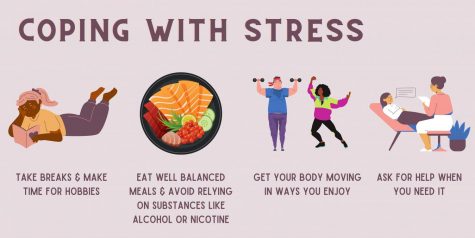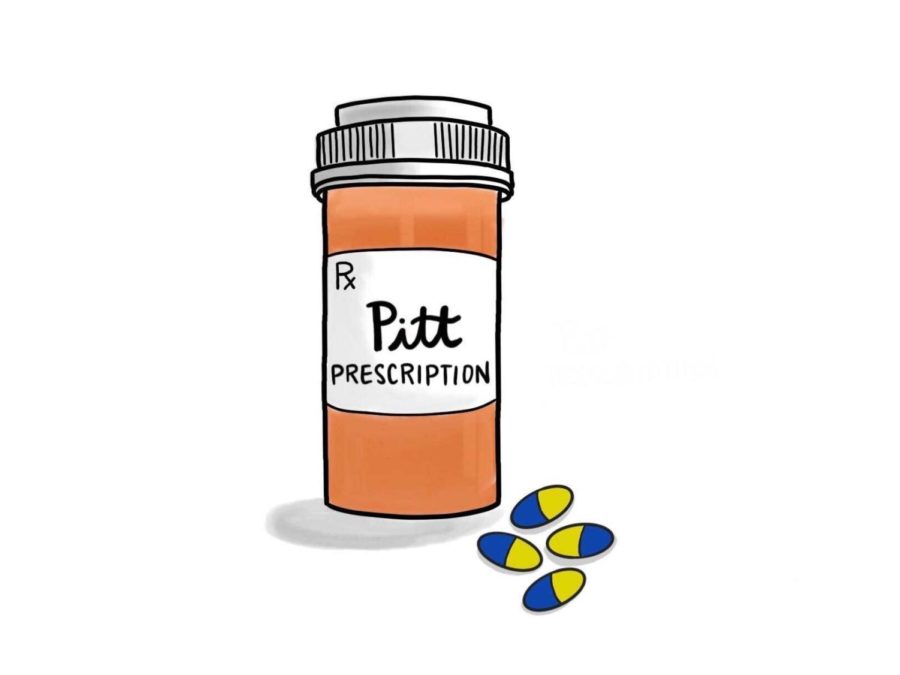The Pitt Prescription | How to cope with stress and burnout
The Pitt Prescription is a biweekly blog where student pharmacist and senior staff writer Elizabeth Donnelly provides tips on how to stay healthy in college. This edition was reviewed by Karen Pater, PharmD., CDCES, BCACP.
Shruti Talekar | Contributing Editor
The Pitt Prescription
December 9, 2021
The past year and a half has significantly impacted the mental well-being of the general public, and for many students, the stress from the COVID-19 pandemic combined with daily struggles may feel almost unmanageable.
It’s hard to believe that in a few short months, the COVID-19 pandemic will be two years old. Back in March 2020, I went home on spring break as a first-year student pharmacist and somehow I am now one semester away from finishing my didactic pharmacy training.
Throughout this transition back to in-person learning, I have felt the crushing anxiety and stress associated with my life doing basically a full 180 from last year to now. I was just learning how to take classes remotely and do well as an online student when we were thrust back into in-person education. I love being back, but it has been an extremely difficult transition for me, and I know many other students who are experiencing similar feelings.
Now more than ever, students need strong support systems and empathy from their instructors as they transition back into the rigor of an in-person academic setting. Zoom fatigue is real, and there is a lot of benefit from certain classes being live in the classroom. There also needs to be an understanding that different students need different amounts of time to adjust back to their academic habits of almost two years ago.
Stress can manifest in several different ways, including intense emotions, changes in appetite and energy levels and difficulty concentrating and sleeping. It is also seen as worsening chronic health issues, mental health conditions and increased self-harm behaviors like substance misuse and unhealthy eating habits.
Burnout is particularly a concern with students due to the pandemic and the stress of re-adjusting to in-person education. A recent survey found that college student burnout rose from 40% in August 2020 to 71% in April 2021, with anxiety and depression also on the rise among students, even as they are returning to some sense of normalcy.
The pandemic and return to in-person education have caused stress that has a real impact on the lives of each student to varying degrees. It is important to work to minimize stress as much as possible and to form healthy coping mechanisms that can assist students in their times of need. By forming these healthy habits, students can work to become more resilient and rely on these methods rather than unhealthy agents like alcohol or nicotine.
While it is normal to experience stress and worry throughout a pandemic, many students face other stressors on top of these that severely impact their well-being. Several factors play a role in combating this, the most important of which are the formation of healthy habits to help manage emotions and mental health.

There are several strategies that may help alleviate stress and burnout, with the most common being practicing techniques like the ones outlined below.
Take breaks
It is not healthy to fixate on or get worked up over one thing for long periods of time. Consider taking breaks and splitting up your work with fun activities or hobbies that can act as de-stressors.
Practice self-care
Try to avoid overuse of substances like alcohol, nicotine and caffeine as coping mechanisms for stressful situations. Instead, attempt to eat well-balanced meals and get enough sleep each night, although I know that’s easier said than done while in college. If possible, exercise on a set schedule — even a small amount of physical movement is better than nothing. If going to the gym doesn’t excite you, find a dance tutorial on YouTube and learn it in your living room. The possibilities are endless when it comes to moving your body – my personal favorite is playing Just Dance on the TV.
Set time aside to do things you enjoy
This is probably one of the hardest things to do, especially during finals season, but it is important you have some personal time dedicated to relaxation and enjoyment rather than school or work. Take two hours to watch your favorite movie, go to Phipps with a friend to see their winter light show or even make a trip to the Strip District to see the immersive Van Gogh exhibit. Taking this little bit of time away from work will not only help you relax and clear your mind, but will likely make you more productive when you return.
Ask for help when needed
Remember, it’s okay to not be okay. If you need help or are struggling in any way, reaching out sooner rather than later is always the best strategy. Whether it be related to mental health concerns or needing an extension for an assignment, there are resources available to help students succeed. The University Counseling Center is always open for students who have mental health concerns, and the Office of Disability Resources and Services has several processes students can work through to receive any academic support they may need.
Unfortunately, there is no miracle tablet or capsule that can reduce stress, but working on these coping mechanisms is a great way to begin to improve your mental health and feelings of burnout. As finals approach, keep these methods in mind and try to utilize them as best as possible to minimize burnout and maximize self-care.
Elizabeth writes primarily about self-care and pharmacological topics. For questions, comments or concerns, you can reach her at [email protected].








